HI5013: Managing Across Borders - CSR Role in Business Report
VerifiedAdded on 2022/09/18
|9
|1917
|36
Report
AI Summary
This report provides a comprehensive analysis of the role of Corporate Social Responsibility (CSR) in the current business environment. It begins with an introduction to CSR and its importance, followed by an overview of CSR's definition and its significance. The report then delves into the crucial role of CSR in the present business scenario, highlighting how companies utilize CSR practices for risk management, employee recruitment, and brand enhancement. It explores the advantages and disadvantages of implementing CSR, including increased goodwill, improved reputation, and the potential for higher costs. Practical examples of companies like Google and Coca-Cola are used to illustrate the concepts. The report concludes by emphasizing the vital role of CSR in managing company growth and improving brand image, supported by relational theory and other academic references.
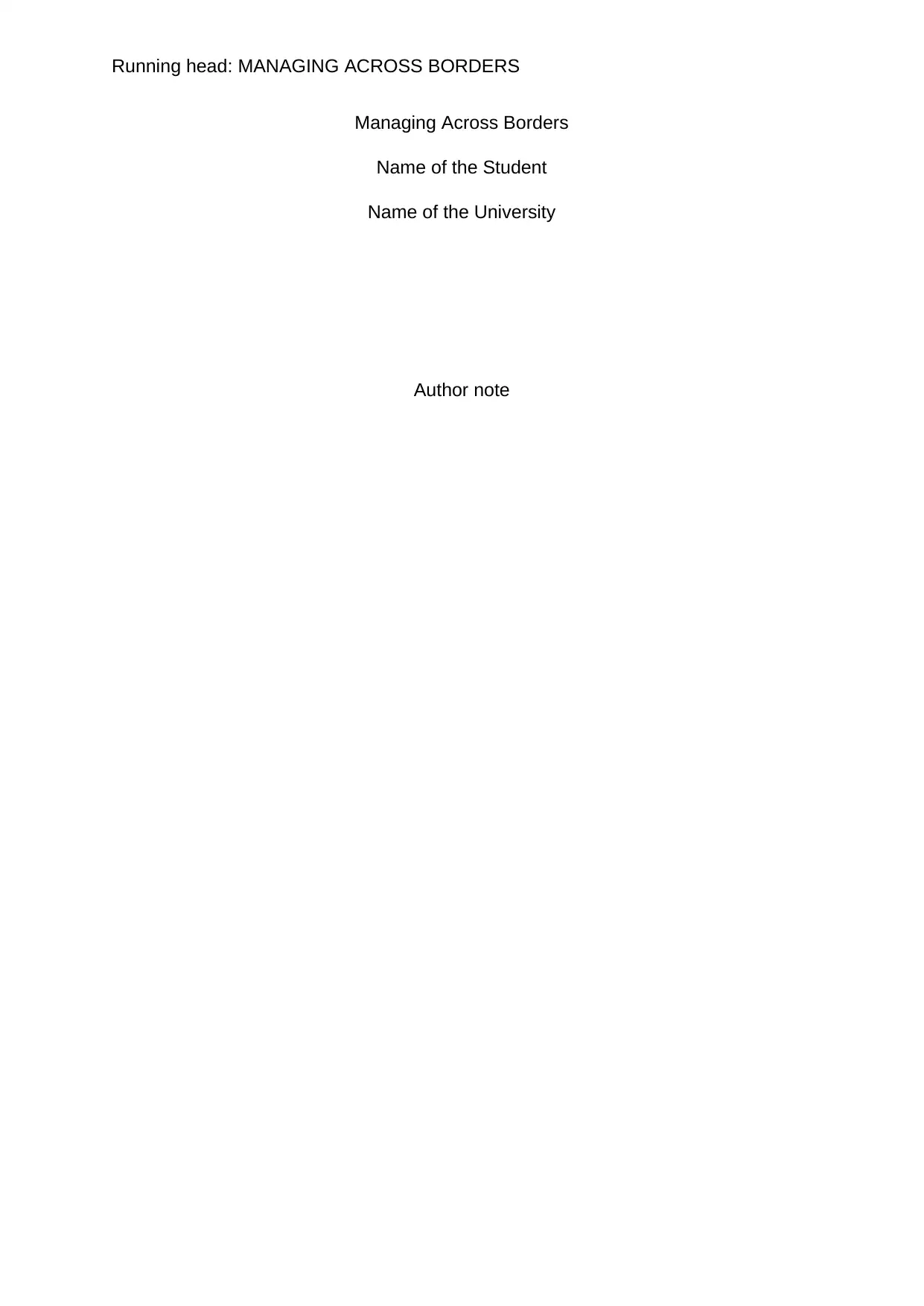
Running head: MANAGING ACROSS BORDERS
Managing Across Borders
Name of the Student
Name of the University
Author note
Managing Across Borders
Name of the Student
Name of the University
Author note
Paraphrase This Document
Need a fresh take? Get an instant paraphrase of this document with our AI Paraphraser
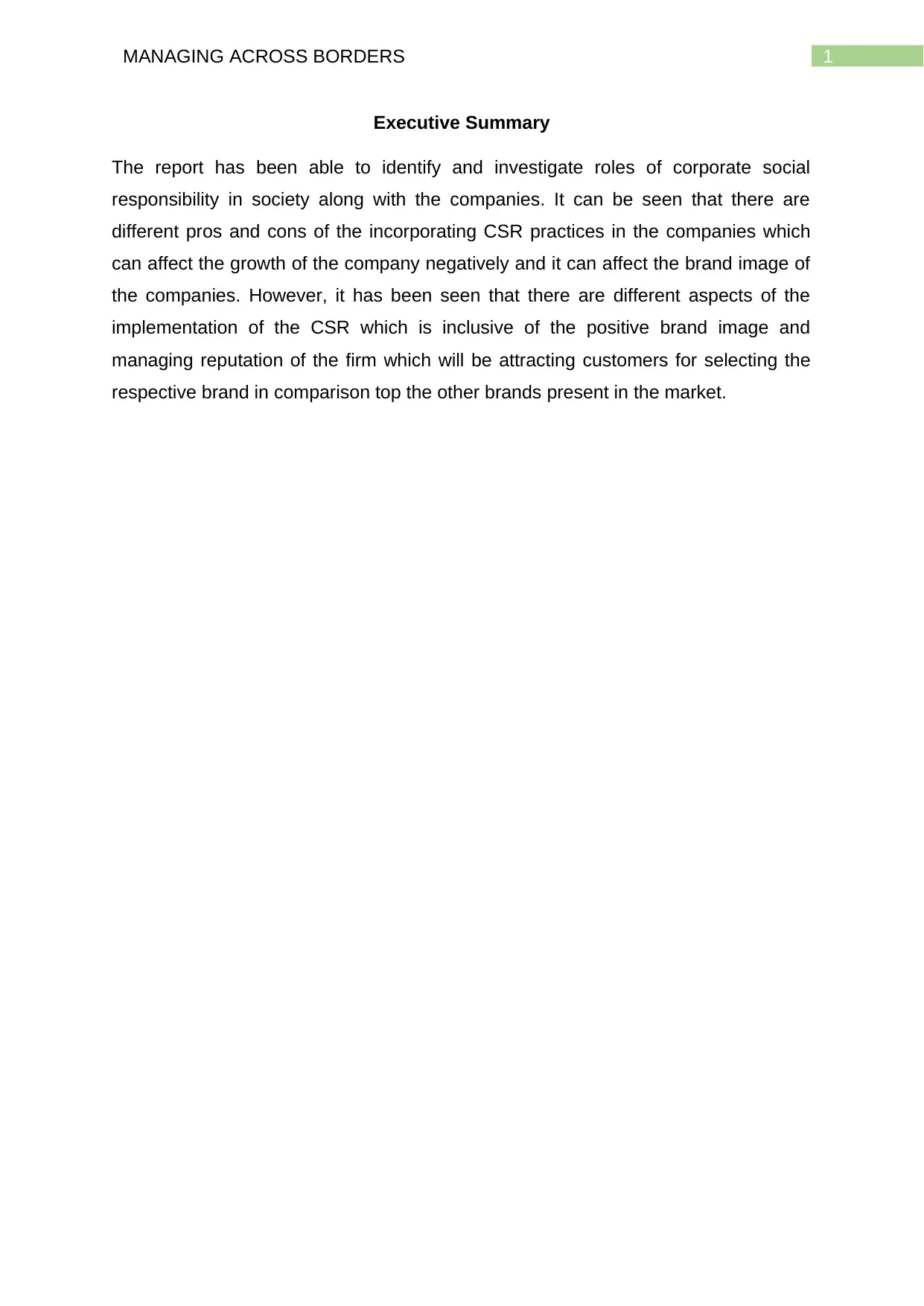
1MANAGING ACROSS BORDERS
Executive Summary
The report has been able to identify and investigate roles of corporate social
responsibility in society along with the companies. It can be seen that there are
different pros and cons of the incorporating CSR practices in the companies which
can affect the growth of the company negatively and it can affect the brand image of
the companies. However, it has been seen that there are different aspects of the
implementation of the CSR which is inclusive of the positive brand image and
managing reputation of the firm which will be attracting customers for selecting the
respective brand in comparison top the other brands present in the market.
Executive Summary
The report has been able to identify and investigate roles of corporate social
responsibility in society along with the companies. It can be seen that there are
different pros and cons of the incorporating CSR practices in the companies which
can affect the growth of the company negatively and it can affect the brand image of
the companies. However, it has been seen that there are different aspects of the
implementation of the CSR which is inclusive of the positive brand image and
managing reputation of the firm which will be attracting customers for selecting the
respective brand in comparison top the other brands present in the market.
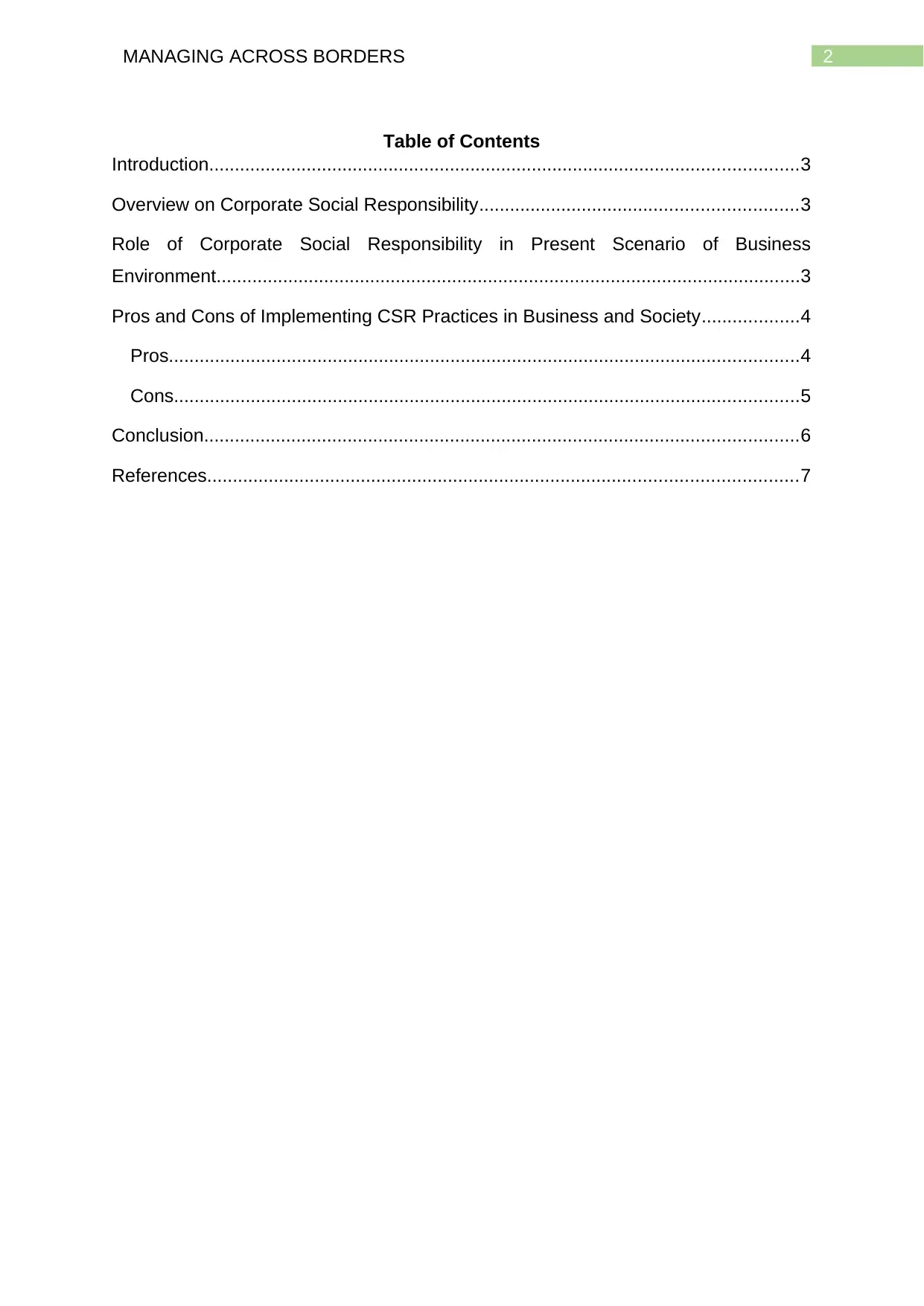
2MANAGING ACROSS BORDERS
Table of Contents
Introduction...................................................................................................................3
Overview on Corporate Social Responsibility..............................................................3
Role of Corporate Social Responsibility in Present Scenario of Business
Environment..................................................................................................................3
Pros and Cons of Implementing CSR Practices in Business and Society...................4
Pros...........................................................................................................................4
Cons..........................................................................................................................5
Conclusion....................................................................................................................6
References...................................................................................................................7
Table of Contents
Introduction...................................................................................................................3
Overview on Corporate Social Responsibility..............................................................3
Role of Corporate Social Responsibility in Present Scenario of Business
Environment..................................................................................................................3
Pros and Cons of Implementing CSR Practices in Business and Society...................4
Pros...........................................................................................................................4
Cons..........................................................................................................................5
Conclusion....................................................................................................................6
References...................................................................................................................7
⊘ This is a preview!⊘
Do you want full access?
Subscribe today to unlock all pages.

Trusted by 1+ million students worldwide
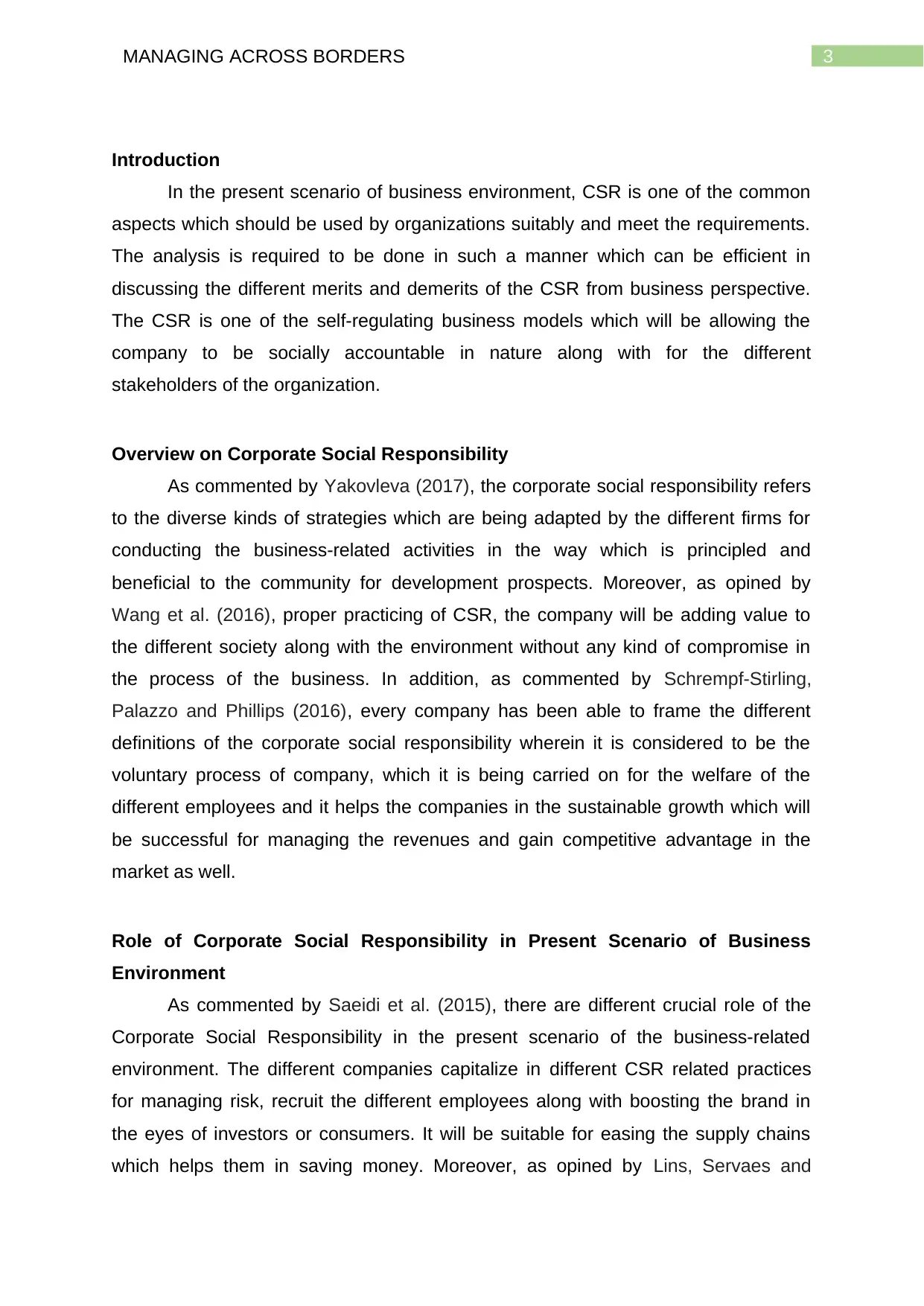
3MANAGING ACROSS BORDERS
Introduction
In the present scenario of business environment, CSR is one of the common
aspects which should be used by organizations suitably and meet the requirements.
The analysis is required to be done in such a manner which can be efficient in
discussing the different merits and demerits of the CSR from business perspective.
The CSR is one of the self-regulating business models which will be allowing the
company to be socially accountable in nature along with for the different
stakeholders of the organization.
Overview on Corporate Social Responsibility
As commented by Yakovleva (2017), the corporate social responsibility refers
to the diverse kinds of strategies which are being adapted by the different firms for
conducting the business-related activities in the way which is principled and
beneficial to the community for development prospects. Moreover, as opined by
Wang et al. (2016), proper practicing of CSR, the company will be adding value to
the different society along with the environment without any kind of compromise in
the process of the business. In addition, as commented by Schrempf-Stirling,
Palazzo and Phillips (2016), every company has been able to frame the different
definitions of the corporate social responsibility wherein it is considered to be the
voluntary process of company, which it is being carried on for the welfare of the
different employees and it helps the companies in the sustainable growth which will
be successful for managing the revenues and gain competitive advantage in the
market as well.
Role of Corporate Social Responsibility in Present Scenario of Business
Environment
As commented by Saeidi et al. (2015), there are different crucial role of the
Corporate Social Responsibility in the present scenario of the business-related
environment. The different companies capitalize in different CSR related practices
for managing risk, recruit the different employees along with boosting the brand in
the eyes of investors or consumers. It will be suitable for easing the supply chains
which helps them in saving money. Moreover, as opined by Lins, Servaes and
Introduction
In the present scenario of business environment, CSR is one of the common
aspects which should be used by organizations suitably and meet the requirements.
The analysis is required to be done in such a manner which can be efficient in
discussing the different merits and demerits of the CSR from business perspective.
The CSR is one of the self-regulating business models which will be allowing the
company to be socially accountable in nature along with for the different
stakeholders of the organization.
Overview on Corporate Social Responsibility
As commented by Yakovleva (2017), the corporate social responsibility refers
to the diverse kinds of strategies which are being adapted by the different firms for
conducting the business-related activities in the way which is principled and
beneficial to the community for development prospects. Moreover, as opined by
Wang et al. (2016), proper practicing of CSR, the company will be adding value to
the different society along with the environment without any kind of compromise in
the process of the business. In addition, as commented by Schrempf-Stirling,
Palazzo and Phillips (2016), every company has been able to frame the different
definitions of the corporate social responsibility wherein it is considered to be the
voluntary process of company, which it is being carried on for the welfare of the
different employees and it helps the companies in the sustainable growth which will
be successful for managing the revenues and gain competitive advantage in the
market as well.
Role of Corporate Social Responsibility in Present Scenario of Business
Environment
As commented by Saeidi et al. (2015), there are different crucial role of the
Corporate Social Responsibility in the present scenario of the business-related
environment. The different companies capitalize in different CSR related practices
for managing risk, recruit the different employees along with boosting the brand in
the eyes of investors or consumers. It will be suitable for easing the supply chains
which helps them in saving money. Moreover, as opined by Lins, Servaes and
Paraphrase This Document
Need a fresh take? Get an instant paraphrase of this document with our AI Paraphraser
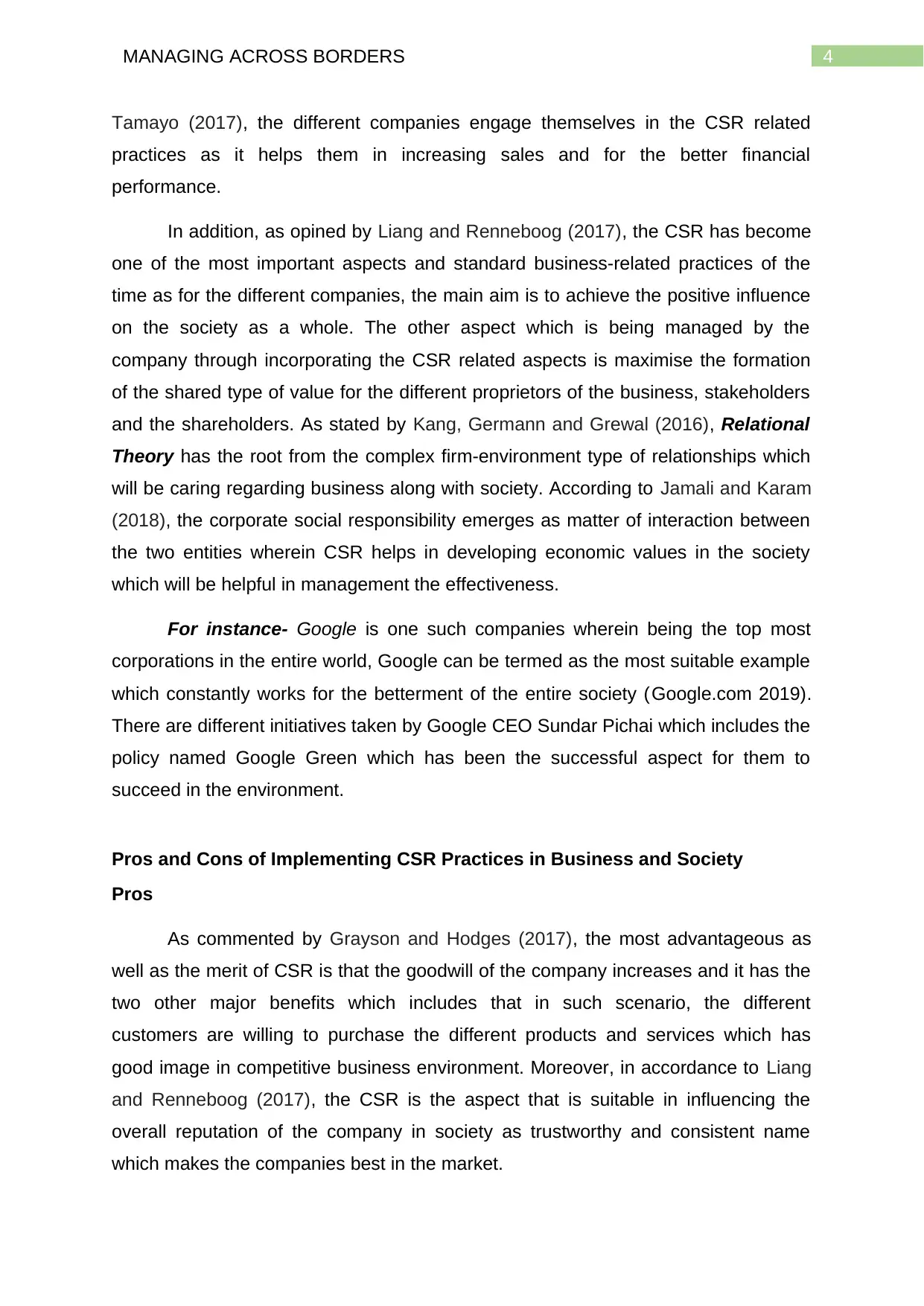
4MANAGING ACROSS BORDERS
Tamayo (2017), the different companies engage themselves in the CSR related
practices as it helps them in increasing sales and for the better financial
performance.
In addition, as opined by Liang and Renneboog (2017), the CSR has become
one of the most important aspects and standard business-related practices of the
time as for the different companies, the main aim is to achieve the positive influence
on the society as a whole. The other aspect which is being managed by the
company through incorporating the CSR related aspects is maximise the formation
of the shared type of value for the different proprietors of the business, stakeholders
and the shareholders. As stated by Kang, Germann and Grewal (2016), Relational
Theory has the root from the complex firm-environment type of relationships which
will be caring regarding business along with society. According to Jamali and Karam
(2018), the corporate social responsibility emerges as matter of interaction between
the two entities wherein CSR helps in developing economic values in the society
which will be helpful in management the effectiveness.
For instance- Google is one such companies wherein being the top most
corporations in the entire world, Google can be termed as the most suitable example
which constantly works for the betterment of the entire society (Google.com 2019).
There are different initiatives taken by Google CEO Sundar Pichai which includes the
policy named Google Green which has been the successful aspect for them to
succeed in the environment.
Pros and Cons of Implementing CSR Practices in Business and Society
Pros
As commented by Grayson and Hodges (2017), the most advantageous as
well as the merit of CSR is that the goodwill of the company increases and it has the
two other major benefits which includes that in such scenario, the different
customers are willing to purchase the different products and services which has
good image in competitive business environment. Moreover, in accordance to Liang
and Renneboog (2017), the CSR is the aspect that is suitable in influencing the
overall reputation of the company in society as trustworthy and consistent name
which makes the companies best in the market.
Tamayo (2017), the different companies engage themselves in the CSR related
practices as it helps them in increasing sales and for the better financial
performance.
In addition, as opined by Liang and Renneboog (2017), the CSR has become
one of the most important aspects and standard business-related practices of the
time as for the different companies, the main aim is to achieve the positive influence
on the society as a whole. The other aspect which is being managed by the
company through incorporating the CSR related aspects is maximise the formation
of the shared type of value for the different proprietors of the business, stakeholders
and the shareholders. As stated by Kang, Germann and Grewal (2016), Relational
Theory has the root from the complex firm-environment type of relationships which
will be caring regarding business along with society. According to Jamali and Karam
(2018), the corporate social responsibility emerges as matter of interaction between
the two entities wherein CSR helps in developing economic values in the society
which will be helpful in management the effectiveness.
For instance- Google is one such companies wherein being the top most
corporations in the entire world, Google can be termed as the most suitable example
which constantly works for the betterment of the entire society (Google.com 2019).
There are different initiatives taken by Google CEO Sundar Pichai which includes the
policy named Google Green which has been the successful aspect for them to
succeed in the environment.
Pros and Cons of Implementing CSR Practices in Business and Society
Pros
As commented by Grayson and Hodges (2017), the most advantageous as
well as the merit of CSR is that the goodwill of the company increases and it has the
two other major benefits which includes that in such scenario, the different
customers are willing to purchase the different products and services which has
good image in competitive business environment. Moreover, in accordance to Liang
and Renneboog (2017), the CSR is the aspect that is suitable in influencing the
overall reputation of the company in society as trustworthy and consistent name
which makes the companies best in the market.
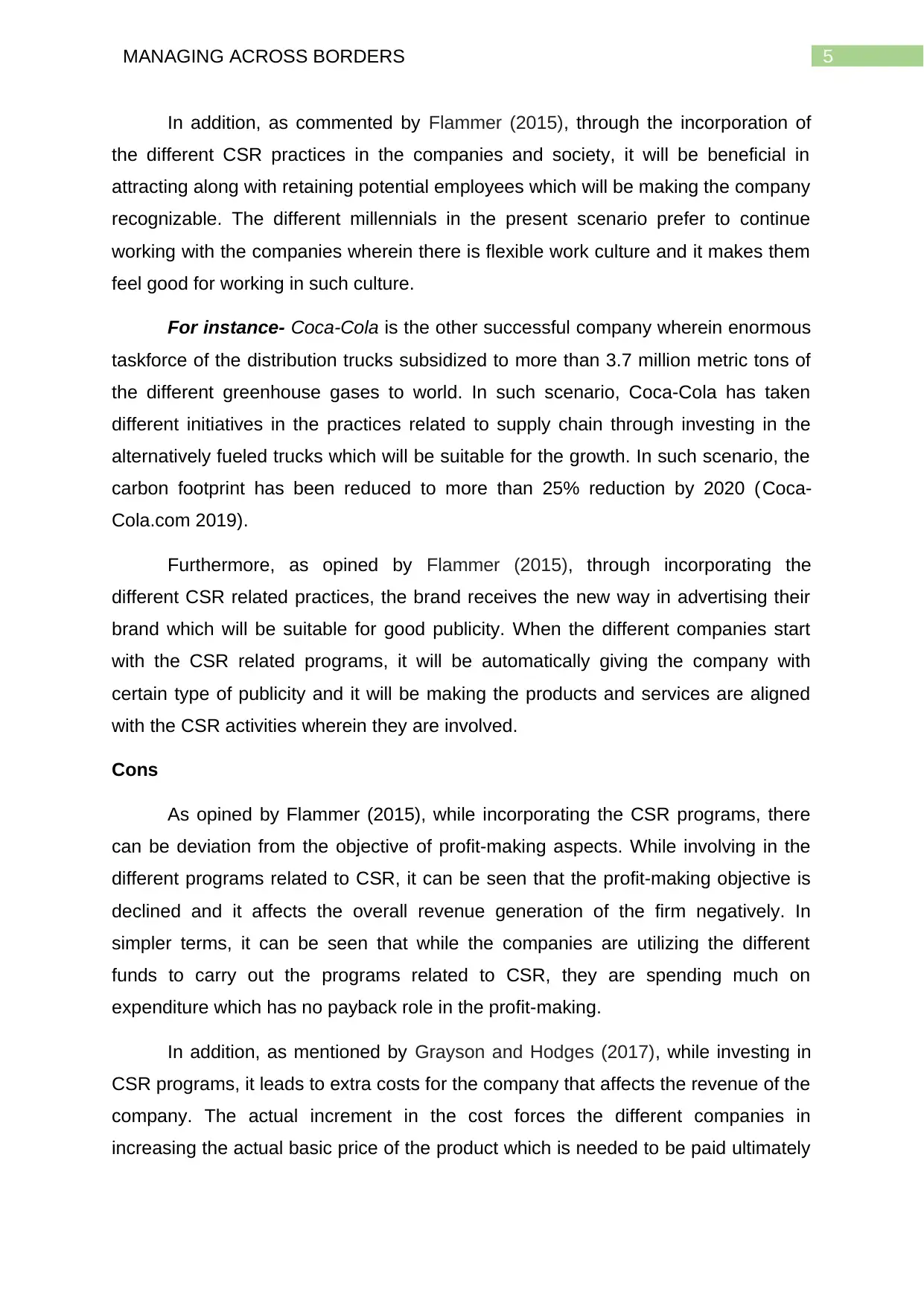
5MANAGING ACROSS BORDERS
In addition, as commented by Flammer (2015), through the incorporation of
the different CSR practices in the companies and society, it will be beneficial in
attracting along with retaining potential employees which will be making the company
recognizable. The different millennials in the present scenario prefer to continue
working with the companies wherein there is flexible work culture and it makes them
feel good for working in such culture.
For instance- Coca-Cola is the other successful company wherein enormous
taskforce of the distribution trucks subsidized to more than 3.7 million metric tons of
the different greenhouse gases to world. In such scenario, Coca-Cola has taken
different initiatives in the practices related to supply chain through investing in the
alternatively fueled trucks which will be suitable for the growth. In such scenario, the
carbon footprint has been reduced to more than 25% reduction by 2020 (Coca-
Cola.com 2019).
Furthermore, as opined by Flammer (2015), through incorporating the
different CSR related practices, the brand receives the new way in advertising their
brand which will be suitable for good publicity. When the different companies start
with the CSR related programs, it will be automatically giving the company with
certain type of publicity and it will be making the products and services are aligned
with the CSR activities wherein they are involved.
Cons
As opined by Flammer (2015), while incorporating the CSR programs, there
can be deviation from the objective of profit-making aspects. While involving in the
different programs related to CSR, it can be seen that the profit-making objective is
declined and it affects the overall revenue generation of the firm negatively. In
simpler terms, it can be seen that while the companies are utilizing the different
funds to carry out the programs related to CSR, they are spending much on
expenditure which has no payback role in the profit-making.
In addition, as mentioned by Grayson and Hodges (2017), while investing in
CSR programs, it leads to extra costs for the company that affects the revenue of the
company. The actual increment in the cost forces the different companies in
increasing the actual basic price of the product which is needed to be paid ultimately
In addition, as commented by Flammer (2015), through the incorporation of
the different CSR practices in the companies and society, it will be beneficial in
attracting along with retaining potential employees which will be making the company
recognizable. The different millennials in the present scenario prefer to continue
working with the companies wherein there is flexible work culture and it makes them
feel good for working in such culture.
For instance- Coca-Cola is the other successful company wherein enormous
taskforce of the distribution trucks subsidized to more than 3.7 million metric tons of
the different greenhouse gases to world. In such scenario, Coca-Cola has taken
different initiatives in the practices related to supply chain through investing in the
alternatively fueled trucks which will be suitable for the growth. In such scenario, the
carbon footprint has been reduced to more than 25% reduction by 2020 (Coca-
Cola.com 2019).
Furthermore, as opined by Flammer (2015), through incorporating the
different CSR related practices, the brand receives the new way in advertising their
brand which will be suitable for good publicity. When the different companies start
with the CSR related programs, it will be automatically giving the company with
certain type of publicity and it will be making the products and services are aligned
with the CSR activities wherein they are involved.
Cons
As opined by Flammer (2015), while incorporating the CSR programs, there
can be deviation from the objective of profit-making aspects. While involving in the
different programs related to CSR, it can be seen that the profit-making objective is
declined and it affects the overall revenue generation of the firm negatively. In
simpler terms, it can be seen that while the companies are utilizing the different
funds to carry out the programs related to CSR, they are spending much on
expenditure which has no payback role in the profit-making.
In addition, as mentioned by Grayson and Hodges (2017), while investing in
CSR programs, it leads to extra costs for the company that affects the revenue of the
company. The actual increment in the cost forces the different companies in
increasing the actual basic price of the product which is needed to be paid ultimately
⊘ This is a preview!⊘
Do you want full access?
Subscribe today to unlock all pages.

Trusted by 1+ million students worldwide
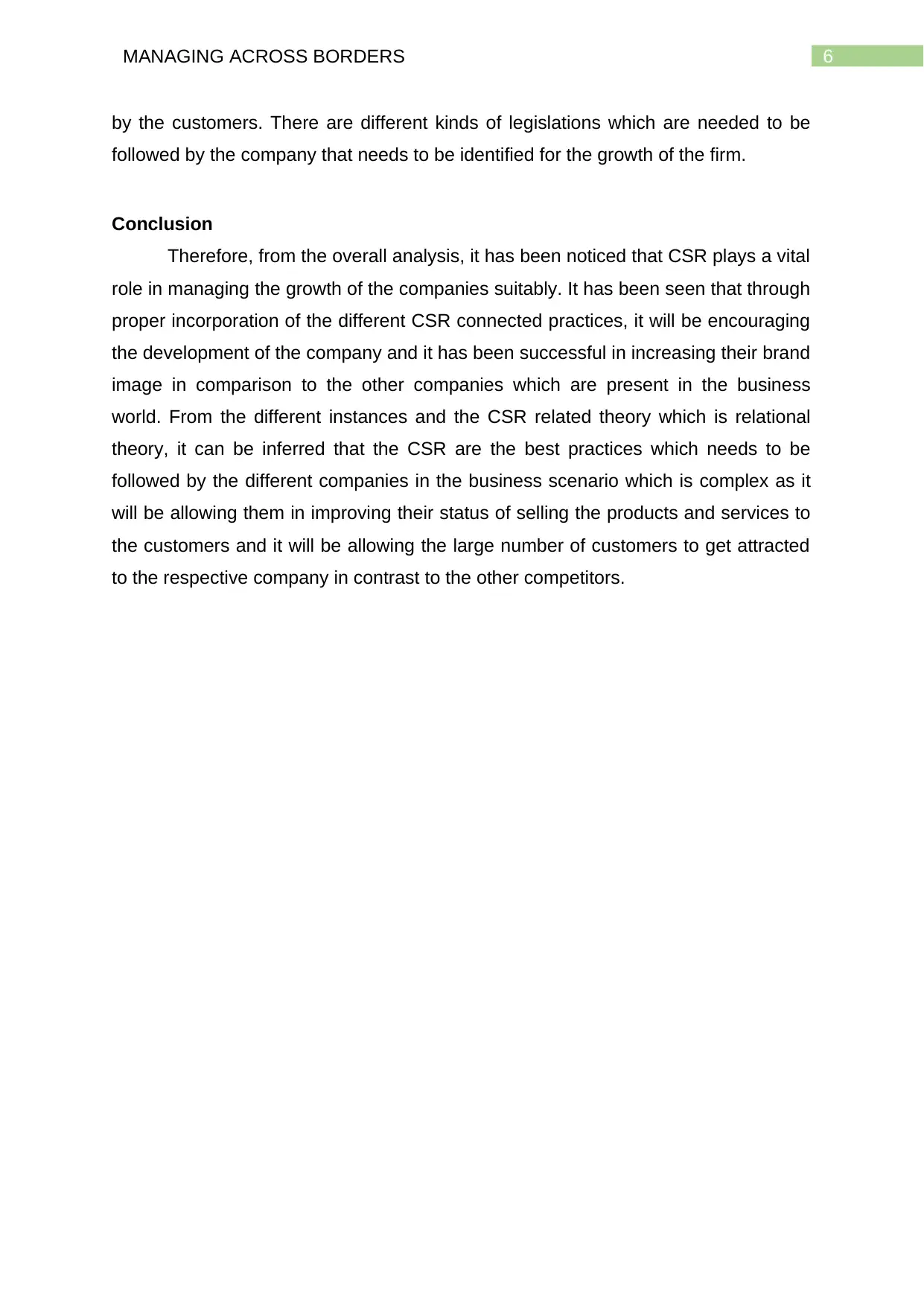
6MANAGING ACROSS BORDERS
by the customers. There are different kinds of legislations which are needed to be
followed by the company that needs to be identified for the growth of the firm.
Conclusion
Therefore, from the overall analysis, it has been noticed that CSR plays a vital
role in managing the growth of the companies suitably. It has been seen that through
proper incorporation of the different CSR connected practices, it will be encouraging
the development of the company and it has been successful in increasing their brand
image in comparison to the other companies which are present in the business
world. From the different instances and the CSR related theory which is relational
theory, it can be inferred that the CSR are the best practices which needs to be
followed by the different companies in the business scenario which is complex as it
will be allowing them in improving their status of selling the products and services to
the customers and it will be allowing the large number of customers to get attracted
to the respective company in contrast to the other competitors.
by the customers. There are different kinds of legislations which are needed to be
followed by the company that needs to be identified for the growth of the firm.
Conclusion
Therefore, from the overall analysis, it has been noticed that CSR plays a vital
role in managing the growth of the companies suitably. It has been seen that through
proper incorporation of the different CSR connected practices, it will be encouraging
the development of the company and it has been successful in increasing their brand
image in comparison to the other companies which are present in the business
world. From the different instances and the CSR related theory which is relational
theory, it can be inferred that the CSR are the best practices which needs to be
followed by the different companies in the business scenario which is complex as it
will be allowing them in improving their status of selling the products and services to
the customers and it will be allowing the large number of customers to get attracted
to the respective company in contrast to the other competitors.
Paraphrase This Document
Need a fresh take? Get an instant paraphrase of this document with our AI Paraphraser
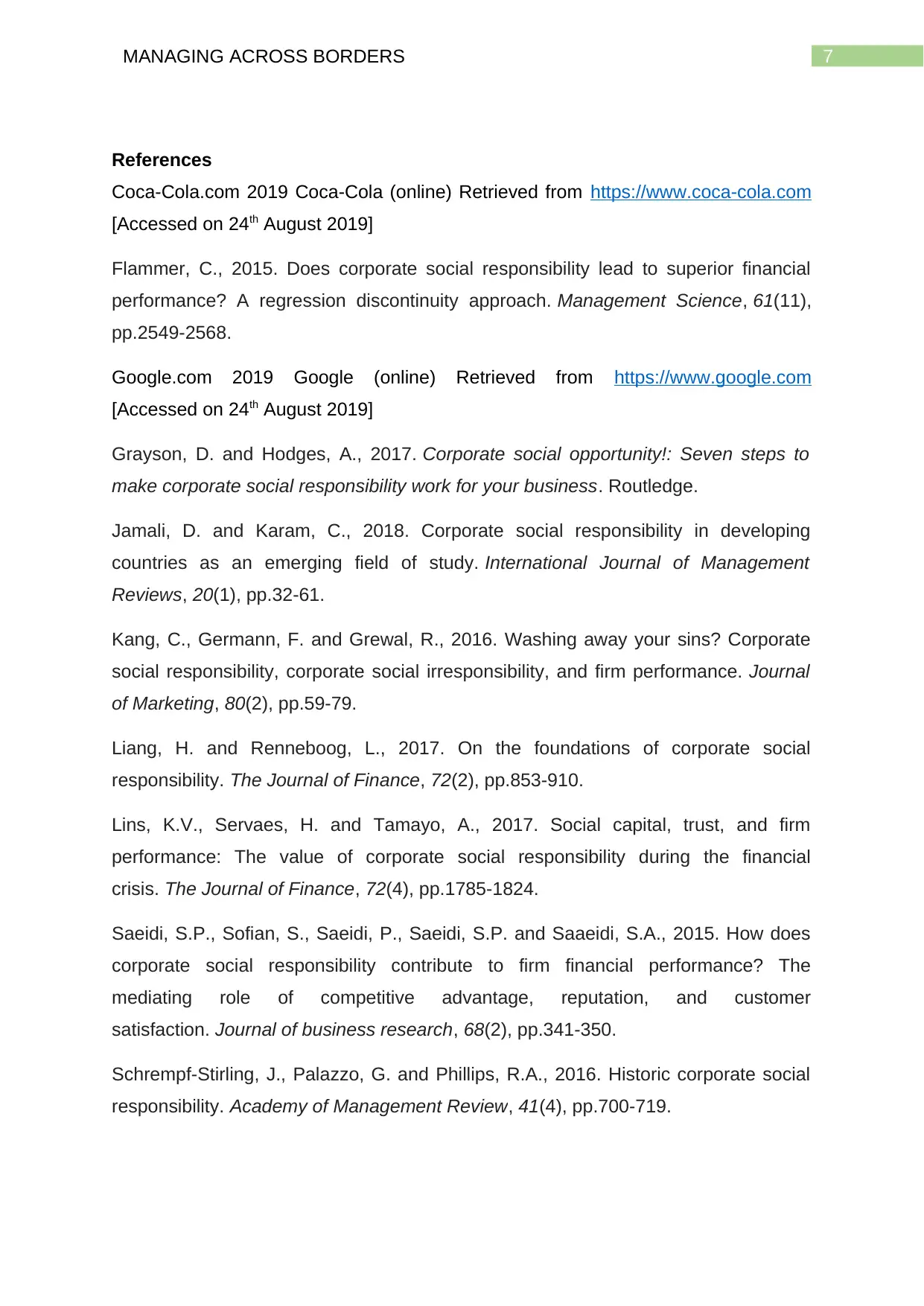
7MANAGING ACROSS BORDERS
References
Coca-Cola.com 2019 Coca-Cola (online) Retrieved from https://www.coca-cola.com
[Accessed on 24th August 2019]
Flammer, C., 2015. Does corporate social responsibility lead to superior financial
performance? A regression discontinuity approach. Management Science, 61(11),
pp.2549-2568.
Google.com 2019 Google (online) Retrieved from https://www.google.com
[Accessed on 24th August 2019]
Grayson, D. and Hodges, A., 2017. Corporate social opportunity!: Seven steps to
make corporate social responsibility work for your business. Routledge.
Jamali, D. and Karam, C., 2018. Corporate social responsibility in developing
countries as an emerging field of study. International Journal of Management
Reviews, 20(1), pp.32-61.
Kang, C., Germann, F. and Grewal, R., 2016. Washing away your sins? Corporate
social responsibility, corporate social irresponsibility, and firm performance. Journal
of Marketing, 80(2), pp.59-79.
Liang, H. and Renneboog, L., 2017. On the foundations of corporate social
responsibility. The Journal of Finance, 72(2), pp.853-910.
Lins, K.V., Servaes, H. and Tamayo, A., 2017. Social capital, trust, and firm
performance: The value of corporate social responsibility during the financial
crisis. The Journal of Finance, 72(4), pp.1785-1824.
Saeidi, S.P., Sofian, S., Saeidi, P., Saeidi, S.P. and Saaeidi, S.A., 2015. How does
corporate social responsibility contribute to firm financial performance? The
mediating role of competitive advantage, reputation, and customer
satisfaction. Journal of business research, 68(2), pp.341-350.
Schrempf-Stirling, J., Palazzo, G. and Phillips, R.A., 2016. Historic corporate social
responsibility. Academy of Management Review, 41(4), pp.700-719.
References
Coca-Cola.com 2019 Coca-Cola (online) Retrieved from https://www.coca-cola.com
[Accessed on 24th August 2019]
Flammer, C., 2015. Does corporate social responsibility lead to superior financial
performance? A regression discontinuity approach. Management Science, 61(11),
pp.2549-2568.
Google.com 2019 Google (online) Retrieved from https://www.google.com
[Accessed on 24th August 2019]
Grayson, D. and Hodges, A., 2017. Corporate social opportunity!: Seven steps to
make corporate social responsibility work for your business. Routledge.
Jamali, D. and Karam, C., 2018. Corporate social responsibility in developing
countries as an emerging field of study. International Journal of Management
Reviews, 20(1), pp.32-61.
Kang, C., Germann, F. and Grewal, R., 2016. Washing away your sins? Corporate
social responsibility, corporate social irresponsibility, and firm performance. Journal
of Marketing, 80(2), pp.59-79.
Liang, H. and Renneboog, L., 2017. On the foundations of corporate social
responsibility. The Journal of Finance, 72(2), pp.853-910.
Lins, K.V., Servaes, H. and Tamayo, A., 2017. Social capital, trust, and firm
performance: The value of corporate social responsibility during the financial
crisis. The Journal of Finance, 72(4), pp.1785-1824.
Saeidi, S.P., Sofian, S., Saeidi, P., Saeidi, S.P. and Saaeidi, S.A., 2015. How does
corporate social responsibility contribute to firm financial performance? The
mediating role of competitive advantage, reputation, and customer
satisfaction. Journal of business research, 68(2), pp.341-350.
Schrempf-Stirling, J., Palazzo, G. and Phillips, R.A., 2016. Historic corporate social
responsibility. Academy of Management Review, 41(4), pp.700-719.
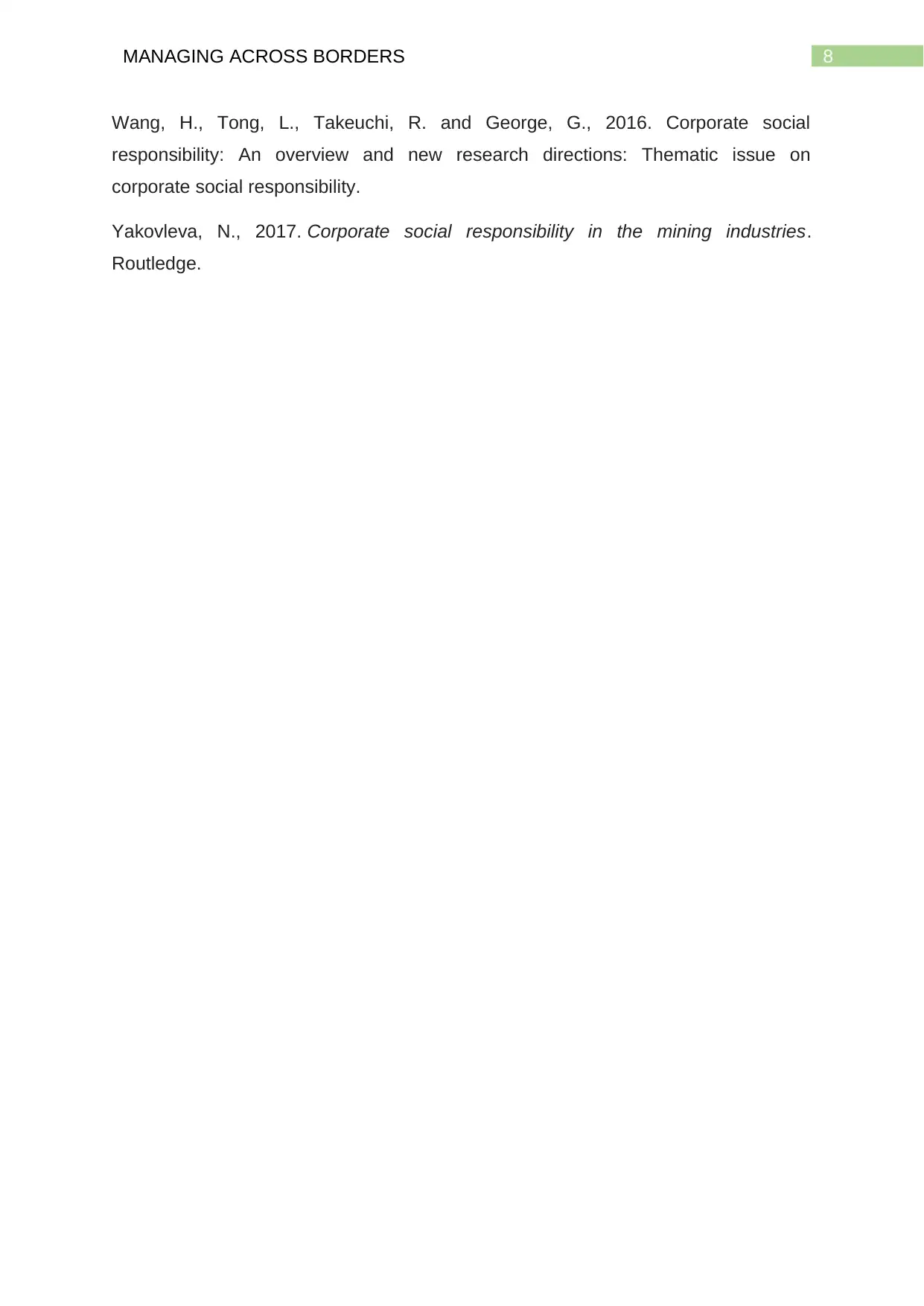
8MANAGING ACROSS BORDERS
Wang, H., Tong, L., Takeuchi, R. and George, G., 2016. Corporate social
responsibility: An overview and new research directions: Thematic issue on
corporate social responsibility.
Yakovleva, N., 2017. Corporate social responsibility in the mining industries.
Routledge.
Wang, H., Tong, L., Takeuchi, R. and George, G., 2016. Corporate social
responsibility: An overview and new research directions: Thematic issue on
corporate social responsibility.
Yakovleva, N., 2017. Corporate social responsibility in the mining industries.
Routledge.
⊘ This is a preview!⊘
Do you want full access?
Subscribe today to unlock all pages.

Trusted by 1+ million students worldwide
1 out of 9
Related Documents
Your All-in-One AI-Powered Toolkit for Academic Success.
+13062052269
info@desklib.com
Available 24*7 on WhatsApp / Email
![[object Object]](/_next/static/media/star-bottom.7253800d.svg)
Unlock your academic potential
Copyright © 2020–2026 A2Z Services. All Rights Reserved. Developed and managed by ZUCOL.





